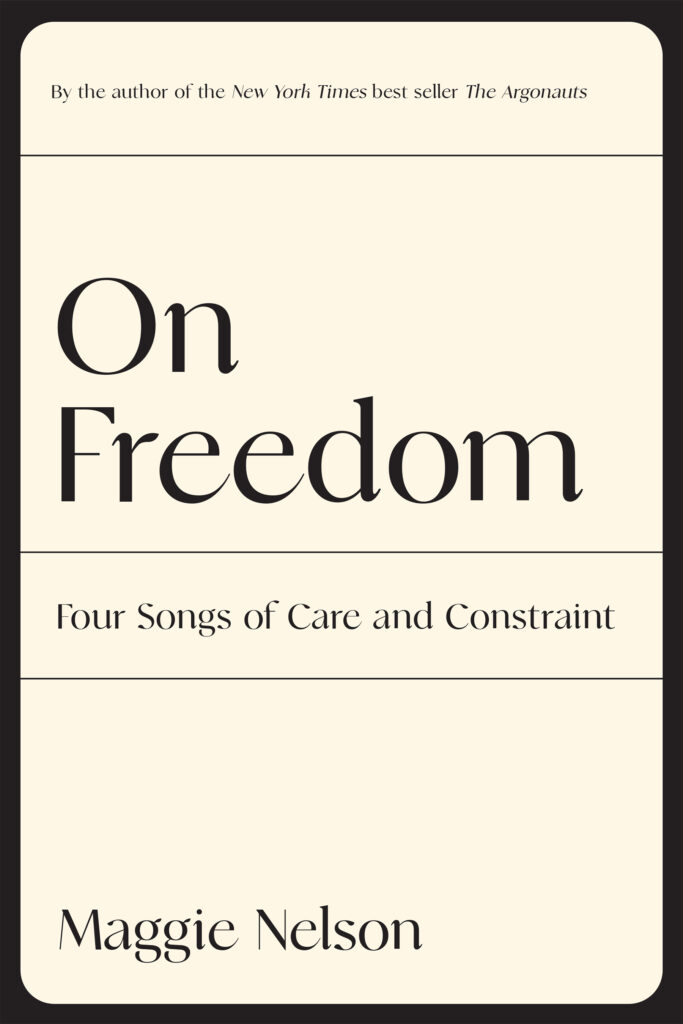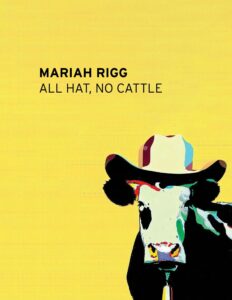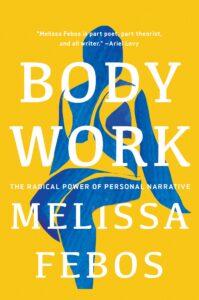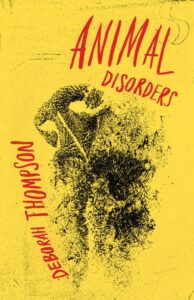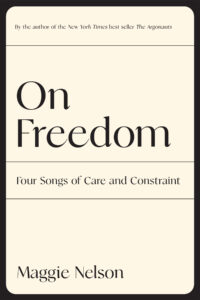Reviewed by Bess Cooley | March 22, 2022
Graywolf Press, September 2021
Hardcover, 288 pages, $27.00
Maggie Nelson isn’t unique in saying that the concept of freedom is complicated. And she doesn’t pretend that On Freedom isn’t going to be an ambitious discussion or a difficult conversation. From the beginning, she acknowledges the animosity of the word, especially as it has to do with mask and vaccine mandates. She’s writing about freedom in a world rife with discussions surrounding it: the Trump presidency and post-presidency, the ongoing pandemic, the climate crisis. But Nelson makes it clear throughout that by “freedom” she doesn’t mean “do whatever you want.” In these four essays she considers how communities interact with each other, and the complications and questions that come with being part of a group, as we all are.
Because this book feels like an exploratory one, Nelson herself trying to figure out what she—and we—really mean by “freedom,” I want to focus on the last essay, “Riding the Blinds,” a phrase that refers to her hope for how we’ll deal with climate change. This essay is where she fully lays out her argument: to have any meaning or effect, freedom—the ways we speak about it and practice it—must be about 1) freedom of others just as much as ourselves, and 2) boththe present and the future.
“Riding the blinds,” Nelson reminds us, means getting from one place to another secretly on a train, traveling on the dangerous space between the cars. Nelson argues this as a metaphor for what might actually be a healthier, freer, more productive relationship with climate change rather than intense, debilitating fear—and far more effectual than arguments claiming that working toward a better climate future limits freedom rather than strengthens it. When riding the blinds, we’re in the moment, Nelson argues, trying to figure out what’s best for us and the people around us. (I’d also add that in a time when our planet has already warmed so much, in a time of wildfires and floods and famine, it becomes essential to consider climate change our present rather than our future.) “‘Living fully in the present’ always entails making choices about lessening or increasing future suffering,” Nelson writes. It’s this point that seems like an answer to the freedom question, or the closest we can get, anyway.
At the beginning of “Riding the Blinds,” Nelson’s focus on her relationship with her son becomes the perfect metaphor for how the terms she sets out with the title—care and constraint—interact. Of course, when we think about climate change, “our children and the children of our children” (as Nelson titles one of the sections of this essay) come to mind generally. But what Nelson does in “Riding the Blinds” is make the concept into a specific—her son, mask off (but only because there’s no one else around) on a bike, riding fast. This eight-year-old is the one throughout the book who will inherit climate change, care, constraint, freedom. And to truly own that freedom, Nelson writes, we need to “[let] ourselves be flooded by ferocious love and [experiment] with how that same love feels with a lessened grip.” It’s that desire for someone else’s freedom that just might save us.
Naomi Klein defines a more sustainable kind of freedom as, according to Nelson, “ceasing to conceptualize [freedom] as the defying of limits, and reimagining it as the practice of negotiating with the various material constraints that give our lives shape and possibility.” And Nelson paraphrases Bruno Latour, too, saying that “thinking about freedom ecologically…involves reckoning with the limitations and possibilities of our shared environment.” “Freedom always arises from the constraints,” she explains. “It’s a creative conversion of it, not some utopian escape from it.” We need the limits of the space between train cars, to stop “doing whatever we want” before we hurt our present and future selves, the people around us, and the children of our children.
Each of the essays in On Freedom explores community and personal relationships rather than any kind of individual freedom. This question has long been the foundation of public discourse: freedom for whom? And does freedom for you necessarily mean a lack of freedom for me? What I take away from On Freedom is that maybe we can’t distinguish between you and me in these instances. We’ve heard some iteration of this before: no one is free until we’re all free. Nelson says that this is ultimately about constant balance between care and constraint, and discussion. Maybe what American society really needs to practice is parenting each other for now and for the future: that kind of intense care with a whole lot of rules, and from which we slowly relinquish control.
ABOUT THE AUTHOR
Maggie Nelson is the author of nine books of poetry and prose, many of which have become cult classics defying categorization. She first published Bluets with Wave Books in 2009; in 2015, Bookforum named Bluets one of the top 10 best books of the past 20 years. Her other nonfiction titles include the National Book Critics Circle Award winner The Argonauts (2015), The Art of Cruelty: A Reckoning (2011; a New York Times Notable Book of the Year), The Red Parts: Autobiography of a Trial (2007), and Women, the New York School, and Other True Abstractions (2007). Her poetry titles include Something Bright, Then Holes (2007), and Jane: A Murder (2005). She writes frequently on art, and in 2016 was awarded a MacArthur “genius” Fellowship. She currently lives in Los Angeles.
ABOUT THE REVIEWER
Bess Cooley won the 2017 Mississippi Review Poetry Prize, and her work has also appeared in Prairie Schooner, Western Humanities Review, American Literary Review, and Verse Daily, among other journals. Her book reviews can be found online at Kenyon Review, Southern Humanities Review, Electric Literature, and Sycamore Review. A graduate of Knox College and the MFA program at Purdue University, she lives in Knoxville and teaches at the University of Tennessee.


